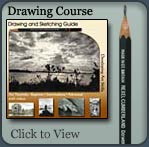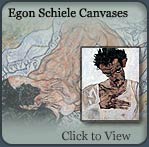Drawing a Portrait with Water-Soluble Graphite PencilsHow to use water soluble pencils |
|||||||||||||
Wetcanvas Guest Lecture by OzonaLori
OverviewWorking with water-soluble graphite, for me, offers the best from both worlds of drawing and painting. It allows the familiarity and comfort-level I feel with drawing, lets me concentrate on value differentiation rather than the mastery of the color wheel, and allows some play with brushwork, which feels like a stepping-stone toward painting. It is also a very easy medium to work with when sketching out in public. I have made portraits in places like a Major League baseball game, using spring water along with my finger for a brush (…a girl’s gotta do what a girl’s gotta do!) In this lesson, I will take you through the steps of creating a water-soluble graphite portrait. In a few easy steps, you will learn how to transform a drawing into a monochromatic painting! Some notes on materials:All you will need is a water-soluble graphite pencil, paper with a smooth finish, water and a soft sable brush. I like to use about a #12 round watercolor brush. A paper towel can also be useful. The pencilMany companies make graphite pencils that are water soluble. Probably the easiest to find, as it is available in all of the large craft chains, is General’s Sketch and Wash pencil. Most of the companies that make watercolor pencils also manufacture water-soluble graphite pencils, as well. Look in the displays to see if the store has included their graphite versions as well. Usually you can find them in a range from about 4B to 8B. I have not really found a need to get a range of these pencils. One good dark one is generally all that is needed. My favorite brands are a little harder to find: Karisma Graphite Aquarelle by Berol and Cretacolor’s Monolith 4B with a paintbrush symbol on it. The Karisma Graphite Aquarelle pencil comes in Medium, Soft and Extra Soft. They dissolve beautifully and feel wonderful on the paper in the drawing stage. The main problem with these is the difficulty in finding them. They are made in Mexico, but the store that I buy them from imports them from England. The Cretacolor pencil is also great to work with and somewhat easier to find, and because it is a solid graphite pencil - no wood- you can use the side of it for broad strokes or shading. It is only available in 4B, as far as I know. The paperAny smooth paper that can take water media will work well. Choose either a cold-pressed watercolor paper, or a sized drawing paper that is designed for water media. I particularly like the Aquabee line of sketch pads- either the #808 or the Globetrotter Sketch Diary. These papers are double-sized to accept wet media, but are in a convenient pad. They are not that easy to find, but have been available for a good price online through Cheap Joe’s. Step 1:First, make your drawing, paying attention to the darks and midtones, and leaving the white of the paper showing in the lighter areas. Your drawing need not be painstakingly shaded, because the painting stage will even out some of the tonal values and allow you to pull some of the darker areas over to shade some of the mid and lighter tones when diluted with the water.  Step 2:Using the wet sable brush, add water to the drawn areas and let them dissolve into the graphite paint. Experiment with both dabbing the brush, and letting it slide over the surface of the drawn lines to see what happens. You can redistribute the tonal values by pulling midtones from the darker areas.   Use the paper towel as an additional tool. It is great to keep one folded up to blot your brush on, and a crumpled up towel can help you lift out highlights or even add texture.  Step 3:Add additional tonal values where needed by drawing lines or shading.   Step 4:Add additional detail.  Step 5:Let the drawing dry completely and add final details with dry media.  Completed Portrait Detail from Finished Portrait:  To see my other artwork, visit my galleries on pbase Artist's Bio
OzonaLori Lori has loved the Arts her entire life. From an early age, she sang with choirs, made things from found objects and even designed her own clothes. Lori received her BFA from the University of South Florida, with Drawing as her main emphasis, and Photography as her secondary area of interest. Music is also an important part of Lori’s life. She is a performing singer-songwriter, who plays acoustic guitar, hand drums and mountain dulcimer. Lori was part of a female contemporary folk trio for three years, who played acoustic venues and music festivals all over Florida. Her group also recorded and produced a CD while they were together. Today, Lori designs and sells her jewelry, helps her husband manage their real estate investments, volunteers at her daughter’s school, teaches elective courses and works as much as possible on her art and music. Article, Copyright OzonaLori, 2005
|
|||||||||||||










